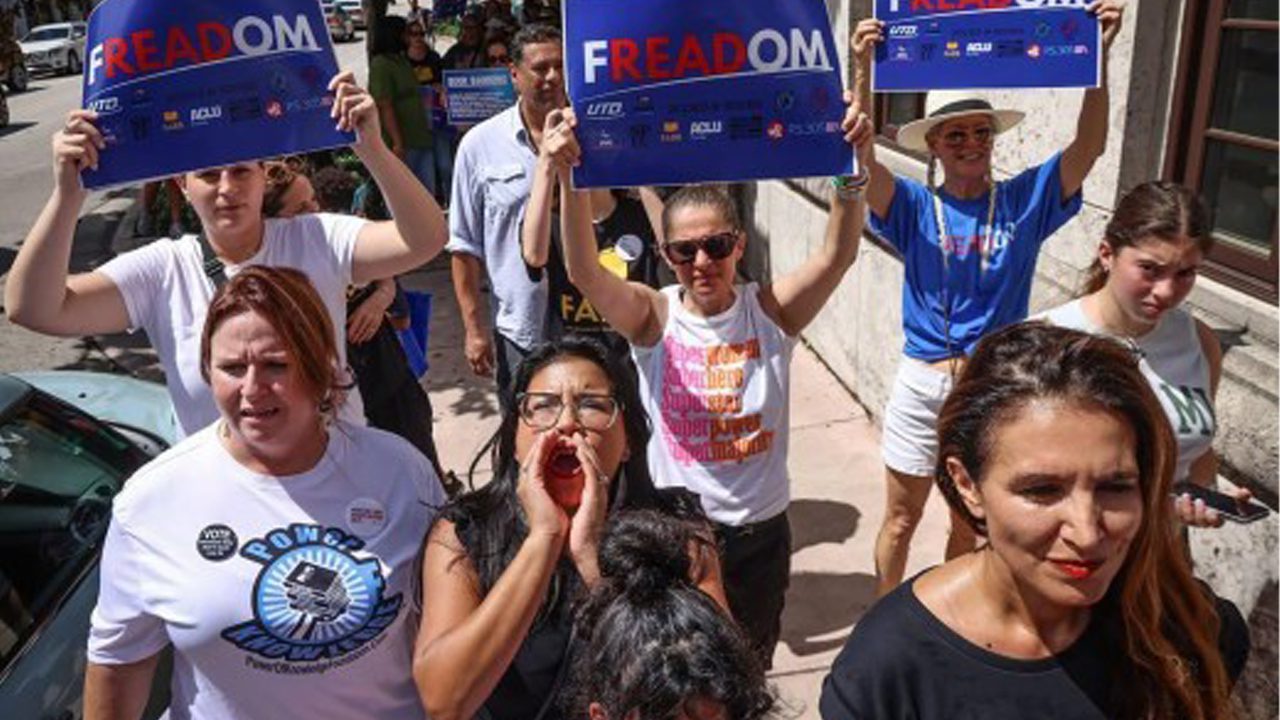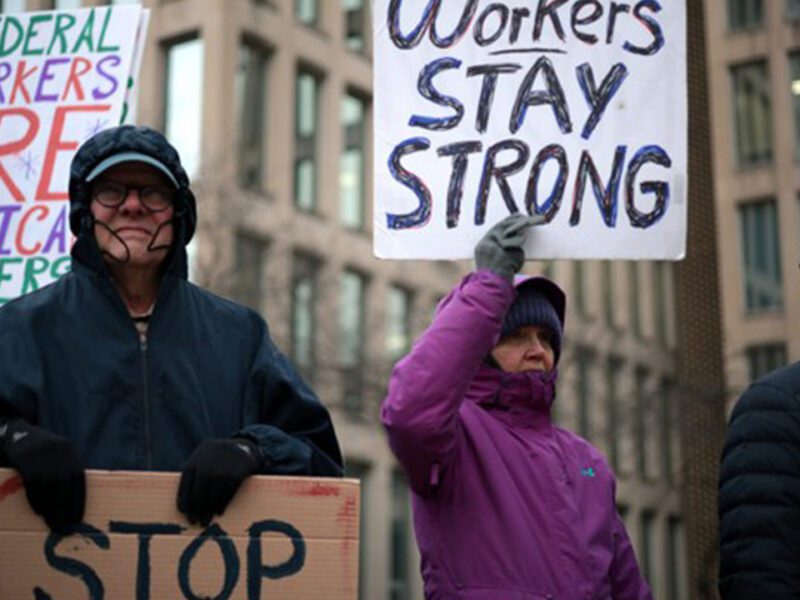
Parents’ groups rise up against school book bans in Florida
‘We see it as a threat to democracy’
Orlando Sentinel | By The Miami Herald |October 17, 2023
MIAMI — When Miami-Dade County Schools restricted Amanda Gorman’s inaugural poem and other titles only to middle school students in a K-8 school, Lissette Fernandez, a parent, was “completely taken aback.”
In May, a parent of two students at Bob Graham Education Center in Miami Lakes challenged five titles: The ABCs of Black History, Cuban Kids, Countries in the News: Cuba, Love to Langston and Gorman’s poem, The Hill We Climb, recited at President Joe Biden’s inauguration on Jan. 20, 2021. She claimed they included references of critical race theory, “indirect hate messages,” gender ideology and indoctrination.
To have one parent’s complaint lead to Gorman’s poem, Cuban Kids, The ABCs of Black History and Love to Langston being barred from the elementary school shelves — even after the parent admitted to not having read the whole poem or books — “was appalling. I felt it was time to start speaking out,” said Fernandez.
One month later, in June, she co-founded Moms for Libros, one of several local parent groups that have popped up in the past year or two to push back on book bans — often joining forces with national and Florida-based organizations such as the Florida Freedom to Read Project to ensure access to books and reading materials. On Wednesday, BannedBooksUSA.org launched to battle the rising number of challenges across Florida.

The coalitions have homed in on Moms for Liberty, a Gov. Ron DeSantis-linked group founded in Florida that has made book bans a big part of their agenda. As part of its tactics, the group encourages its members to appear at school board meetings and read the “worst” part of a book to provoke a board member to cut them off, a strategy that can lead to the book being temporarily removed, as reported by the Orlando Sentinel.
Moms for Liberty also has also spewed misinformation at board meetings about what is or isn’t being taught in classrooms, leading the Southern Poverty Law Center to recently label it an extremist group.
“We really needed to have a counter voice,” said Hedieh Sepehri, a founder of Families Against Banning Books, a Miami-based organization. “We wanted to show that Moms for Liberty wasn’t the majority [in Miami-Dade County public schools]. They just happened to be more organized.”
That voice was clear earlier this month, when a group of newly formed and established organizations came together to kick off national “Banned Books Week,” marching from the Coral Gables Congregational United Church of Christ to the flagship Books & Books store just two miles away. The week-long event ran from Oct. 1-8.
Some of the marchers wore black or royal blue shirts that read, FREADOM, with ‘read’ in a bright red. Others wore black shirts with bright yellow letters reading ‘FAAB,’ the acronym for Sepehri’s organization. A handful wore a navy blue shirt that had ‘Miami Freedom Project’ written across the chest.
Regardless of the shirt, the overall message was the same: They were there to push back on not just efforts to restrict books, but to raise awareness about what they believe is a larger movement to censor certain topics, people and ideas.
“What I think is extremely important is that we show that there are other voices beside the most loud voices that we’ve heard up until now — that oppose the laws and the attitude of the politicians who are trying to weaponize books for their own game,” Mitchell Kaplan, owner of Books & Books, told the Herald during the march.
Any attempt to restrict reading — or restrict learning about one’s history and the history of others — he said, is an attempt to “whitewash history” in a way that prevents young people from understanding “the beauty” of democracy and also what’s needed to “make it even better.”
Book bans motivate new groups
When Sepehri founded Families Against Banning Books in the late spring of 2022, she set out to educate herself and others about new education laws passing in Tallahassee. Among them were the Parental Rights in Education law, commonly known as “Don’t Say Gay,” which initially prohibited teaching gender identity or sexual orientation in kindergarten through third grade but was extended through eighth grade in the 2023 Legislative Session, and the Stop Woke Act, which limits discussions of race and racism in the classroom.
Despite priding herself on “being in the know” and an active participant in her children’s education, Sepehri admits now she was “clueless” about the new laws.
But as her efforts — and the organization — grew, Sepehri understood the “fight” wasn’t about restricting one or two books. Instead, she said, conservatives in Tallahassee and locally were trying to “impose a level of control and target certain communities” through books.

“People get caught up on the wording of things (like ‘Banned Book Week’) instead of focusing on the bigger issues, like restricting access and what that means for students,” she said. “While we’re fighting for a particular book to be available, the real fight is about the banning of ideas.”
Crystal Etienne, founder of Power of Knowledge, which launched in May 2022 to “fight back against the dismantling of public education,” shared similar sentiments. Pushing back against book bans is important, but people should also focus on other issues, such as the “draining” of public funds from public schools, said the seventh-grade civics teacher at West Homestead K-8 Center.
All the culture war issues — from new laws, attacks on the LGBTQ community, book banning and new African American history standards that said slaves could have benefited from their enslavement — are meant to “keep attention off what (lawmakers) are actually doing,” she argued. “Everyone is focused on these specific things and not the policies being made.”
Nevertheless, Etienne acknowledged, the book banning discourse has brought attention to what is occurring in public schools: “It’s making people look deeper.”
Like Moms for Libros, restricting Gorman’s poem served as a catalyst for some groups, which for Ana Sofía Peláez, co-founder and executive director of Miami Freedom Project, isn’t surprising. Gorman, 22 when she recited her poem, was the youngest inaugural poet in U.S. history.
“It was the chilling effect,” said Peláez. The organization advocates for more civic engagement and participation but has also homed in on education issues more recently, including participating in Banned Books Week. “Amanda Gorman being a young person [and] the idea that something she wrote (…) would be removed from book shelves was so clear how wrong it was, and a vivid example of where the overreach is.
“It was something that everyone was able to respond to and get behind,” she said.
Like Sepehri and Etienne, Peláez argues the book challenges are symptomatic of a larger problem, that is, how adults create safe and supportive environments for students. If the majority of books about the Black or Latino experience are targeted for being “problematic” for students, “which students are you talking about” and what message does that send, she said.
Moreover, she argued, the effort has already moved “well beyond the library” and the discourse is no longer “just about what students can self-select from library shelves.”
‘Threat to democracy’
More than 3,300 instances of bans in public school classrooms and libraries have been recorded from July 2022 to June 2023, according to a recent report by PEN America, a national nonprofit that advocates for freedom of expression.
Of those, about 1,400 — or 40% — occurred in Florida, the report states, the most of any state.
Eight books have been banned in Miami-Dade public schools, according to the nonprofit, which defines a book ban as “any action taken against a book based on its content, and as a result of parent or community challenges, administrative decisions, or in response to direct or threatened action by lawmakers or other governmental officials, that leads to a previously accessible book.”
But for Cuban American Women Supporting Democracy, an organization that launched two years ago around racial and gender equality, freedom of expression and separation of church and state issues, even the comparatively small number of book challenges occurring in Miami-Dade County was enough to focus more on education issues.
The organization’s members began attending school board meetings this summer — focusing on what the group’s members say to be “censorship coming from Tallahassee.”
“We see it as a threat to democracy,” said Carolina Camps, the organization’s president. Camps came to Miami from Cuba as a young person, part of the Pedro Pan generation.
Some of the group’s members spoke at the Miami-Dade School Board meeting in September in favor of recognizing October as LGBTQ History Month, which the board rejected. They are also against the Parental Rights in Education law, advocate for stricter statewide gun laws and expanding voter registration in the state.
For Camps, though, one of the more unsettling aspects of board meetings is listening to some of the Cuban-American school board members who use their heritage to restrict classroom materials. Those efforts, she argued, mirror what occurred in Cuba.
“We don’t understand how they don’t see past their background, which is one of having been repressed, censored, ostracized for being who they were or for being a member of a certain political (party). And that’s exactly what [the board members] are doing here.”
Part of the conversation
One of the things conservative groups do well is coalesce behind one broad issue, said Sepehri, the founder of Families Against Banning Books. They often lean on parental rights as a reason to speak against the recognition of LGTBQ History Month or the discussion of race in classrooms.
That’s why the newly formed groups have banded together in recent months to join larger organizations and coalitions. They’ve come together for events like Banned Books Week, but they’ve also joined the Kids’ Right to Read Network, which launched as part of the National Coalition Against Censorship.
“We don’t seem as focused as other groups because we are supporting a large number of issues,” ranging from LGBTQ issues and curriculum changes to teacher pay, said Sepehri. “So right now, we’re trying to focus on freedom and anti censorship — broad issues that encompass the human rights issues impacting the community.”
For Peláez, of the Miami Freedom Project, the effort isn’t necessarily about one group outspeaking or out-yelling another group. Instead, it’s about “being part of the conversation, because we all live with the results.”





